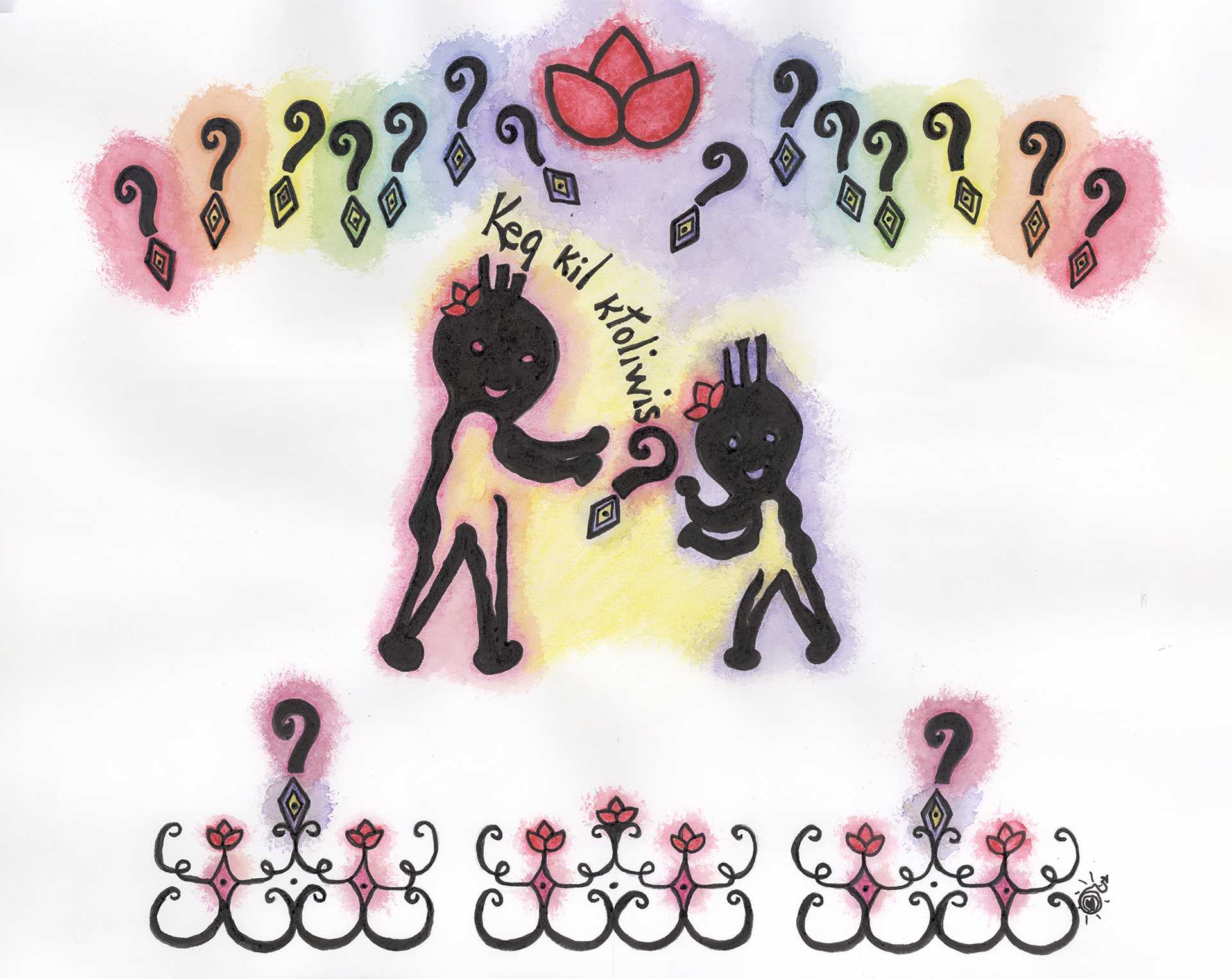


Human beings are created by social interaction. Whether we realize it or not, there are lessons in each interaction. Thus, it is by constantly interacting with our environment, as well as with those around us, that we learn many lessons and that we discover, step by step, who we are and what is our life's mission.
Home / Module 2 / Social interactions


Itomuwiw eleyimok nkiskehkimkunen eli kansuhsok ‘ci petapasihtit musikisqok.

Our oral tradition taught us that our ancestors came from the sky.
Yukt possesomuweyak pomawsuwinuwok ‘kisi witawsumawa Wolastoqi wisoki sipkiw.

These star people stayed with the Wolastoqey people for a long time.
Wikuwinaqsultuwok naka yalitahasultuwok.

It is said that they were both funny and very wise.
Wikuwaci milihponolawa pomawsuwinu.

They liked to play tricks on people.
Anqoc pomawsuwinuwok kisi nomiyawa.

They could only be seen by certain people.
Eleyimok ntoliwiyan “kiwolatomuhsisok”, “apsokiluhtihtit pomawsuwinuwok”.

In our tradition, we call them “kiwolatomusisok”, “the common people”.
Itomuhtuwok, neke kisihtasik kpihikonol sipihkuk, ‘t-awskayuwawa naka ksihkassultuwok tuci neke.

Legend has it that, when the dams were built on our rivers, they were upset and therefore disappeared.
 ⎙
⎙
| Saluer quelqu’un | Greeting someone |


| ||||
|---|---|---|---|---|---|---|
| ‘Qey! | Bonjour! | Hi! |

|
|||
| Woli-sepawiw! | Bon matin! | Good morning! |

|
|||
| Woli kisi-pasqe! | Bon après-midi! | Good afternoon! |

|
|||
| Woli-nipayiw! | Bonne soirée! | Good evening! |

|
|||
| Kulqahsin! | Bonne nuit! | Good night! |

|
|||
| Kulokiskotonoman! | Bonne journée! | Have a good day! |

|
|||
| Kulankeyasin! | Prends soin de toi! | Take care! |

|
|||
| Apc-oc ktolewestuwamol! | On se reparle plus tard! | Talk to you later! |

|
|||
| Apc-oc knomiyul! | Je te reverrai plus tard! | I will see you later! |

|
| Questions et réponses simples | Asking and answering simple questions |


| ||||
|---|---|---|---|---|---|---|
| Keq ktoli olluhk? | Que fais-tu? | What are you doing? | ||||
| Nmacaha. | Je vais à la maison. | I’m going home. |

|
|||
| Ntolluhk. | Je travaille. | I’m working. |

|
|||
| Ntoli utenehk. | Je magazine. | I’m shopping. |

|
|||
| Ntotolahq. | Je cuisine. | I’m cooking. |

|
|||
| Ntoli kotunk. | Je chasse. | I’m hunting. |

|
| Tama kti? | Où es-tu? | Where are you? |


| |||
|---|---|---|---|---|---|---|
| Yut! | Ici! | Here! |

|
|||
| Nil nti nikok (nemaht). | Je suis à la maison. | I’m at my house. |

|
|||
| Qocomok nti. | Je suis dehors. | I’m outside. |

|
|||
| Ihtolokehkitimok nti. | Je suis à l’école. | I’m at school. |

|
|||
| Ihtolahqahtimok nti. | Je suis dans la cuisine. | I’m in the kitchen. |

|
|||
| Lamiw - kcihkuk nti. | Je suis dans la forêt. | I’m in the forest. |

|
| Wolastoq kil? | Es-tu wolastoqey (malécite)? | Are you Wolastoqey? (Maliseet) |


| |||
|---|---|---|---|---|---|---|
| Aha. Wolastoqey nil. | Oui. Je suis wolastoqey. | Yes. I’m Wolastoqey. |

|
|||
| Ontama. Kat nil wolastoqey. | Non. Je ne suis pas wolastoqey. | No. I’m not Wolastoqey. |

|


| ||||||
|---|---|---|---|---|---|---|
| Tama kil kwik? | Où demeures-tu? | Where do you live? |

|
|||
| Nwik nil Montreal. | Je vis à Montréal. | I live in Montreal. | ||||
| Mec-op-al knatassihqi kisi-pasqek? | Est-ce que tu me rejoins cet après-midi? | Will you meet me this afternoon? |

|
|||
| Aha. Knatassihkul-oc qihiw sipok. | Oui. Je vais te rencontrer à la rivière. | Yes. I will meet you by the river. |
| Demandes simples | Simple requests |


| ||||
|---|---|---|---|---|---|---|
| Skicinuwatu. | Parle ta langue autochtone. | Speak your Indigenous language. |

|
|||
| Natqahs. | Va au lit. | Go to bed. |

|
|||
| Nassew. | Habille-toi. | Go get dressed. |

|
|||
| Naci-kossiptinens. | Va laver tes mains. | Go wash your hands. |

|
|||
| Naci-kosseksitens. | Va laver tes pieds. | Go wash your feet. |

|
|||
| Naci-kossiqens. | Va laver ton visage. | Go wash your face. |

|
|||
| Naci-kospalos. | Va prendre un bain (douche). | Go take a bath (shower). |

|
|||
| Naci-kossatpens. | Va laver tes cheveux. | Go wash your hair. |

|
|||
| Micin psiw. | Mange tout. | Eat everything. |

|
|||
| Opin yut. | Assieds-toi ici. | Sit here. |

|
|||
| Ckuwi yut. | Viens ici. | Come here. |

|
|||
| Sehken. | Lève-toi. | Stand up. |

|
|||
| Tokec. | Maintenant. | Now! |

|
|||
| Costaqs. | Tais-toi! | Shut up! |

|
| Phrases importantes | Important sentences |


| ||||
|---|---|---|---|---|---|---|
| Koselomol. | Je t’aime. | I love you. |

|
|||
| Ma-te knostulu. | Je ne comprends pas. | I don’t understand. |

|
|||
| Knostuwi? | Est-ce que tu comprends? | Do you understand? |

|
|||
| Mec-op-al kminuwiwihtomon? | Peux-tu répéter? | Could you repeat? |

|
|||
| Nitap kil. | Tu es mon ami autochtone (masculin). | You are my Indigenous friend (male). |

|
|||
| Nitapesq kil. | Tu es mon amie autochtone (féminin). | You are my Indigenous friend (female). |

|
|||
| Ntutem kil. | Tu es mon ami non autochtone. | You are my non-Indigenous friend (male). |

|
|||
| Ntutemisq kil. | Tu es mon amie non autochtone. | You are my non-Indigenous friend (female). |

|